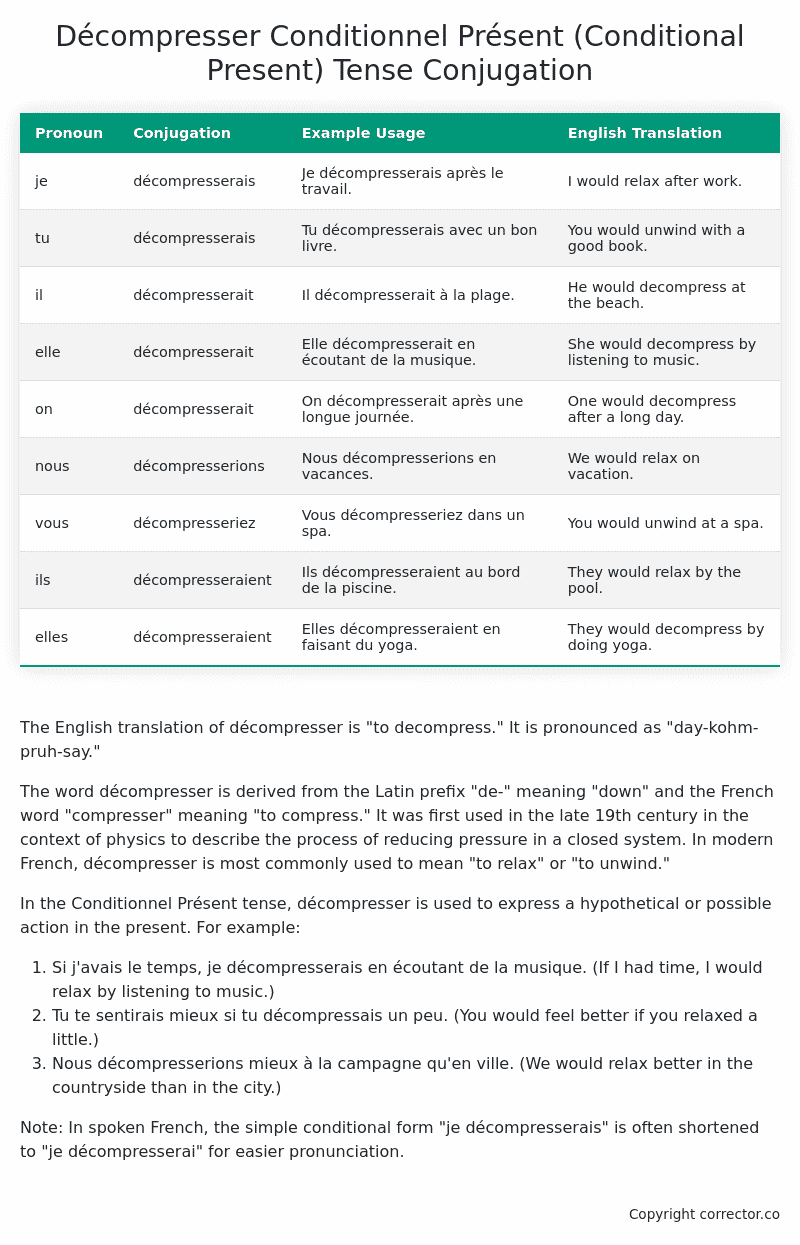Conditionnel Présent (Conditional Present) Tense Conjugation of the French Verb décompresser
Introduction to the verb décompresser
The English translation of décompresser is “to decompress.” It is pronounced as “day-kohm-pruh-say.”
The word décompresser is derived from the Latin prefix “de-” meaning “down” and the French word “compresser” meaning “to compress.” It was first used in the late 19th century in the context of physics to describe the process of reducing pressure in a closed system. In modern French, décompresser is most commonly used to mean “to relax” or “to unwind.”
In the Conditionnel Présent tense, décompresser is used to express a hypothetical or possible action in the present. For example:
- Si j’avais le temps, je décompresserais en écoutant de la musique. (If I had time, I would relax by listening to music.)
- Tu te sentirais mieux si tu décompressais un peu. (You would feel better if you relaxed a little.)
- Nous décompresserions mieux à la campagne qu’en ville. (We would relax better in the countryside than in the city.)
Note: In spoken French, the simple conditional form “je décompresserais” is often shortened to “je décompresserai” for easier pronunciation.
Table of the Conditionnel Présent (Conditional Present) Tense Conjugation of décompresser
| Pronoun | Conjugation | Example Usage | English Translation |
|---|---|---|---|
| je | décompresserais | Je décompresserais après le travail. | I would relax after work. |
| tu | décompresserais | Tu décompresserais avec un bon livre. | You would unwind with a good book. |
| il | décompresserait | Il décompresserait à la plage. | He would decompress at the beach. |
| elle | décompresserait | Elle décompresserait en écoutant de la musique. | She would decompress by listening to music. |
| on | décompresserait | On décompresserait après une longue journée. | One would decompress after a long day. |
| nous | décompresserions | Nous décompresserions en vacances. | We would relax on vacation. |
| vous | décompresseriez | Vous décompresseriez dans un spa. | You would unwind at a spa. |
| ils | décompresseraient | Ils décompresseraient au bord de la piscine. | They would relax by the pool. |
| elles | décompresseraient | Elles décompresseraient en faisant du yoga. | They would decompress by doing yoga. |
Other Conjugations for Décompresser.
Le Present (Present Tense) Conjugation of the French Verb décompresser
Imparfait (Imperfect) Tense Conjugation of the French Verb décompresser
Passé Simple (Simple Past) Tense Conjugation of the French Verb décompresser
Passé Composé (Present Perfect) Tense Conjugation of the French Verb décompresser
Futur Simple (Simple Future) Tense Conjugation of the French Verb décompresser
Futur Proche (Near Future) Tense Conjugation of the French Verb décompresser
Plus-que-parfait (Pluperfect) Tense Conjugation of the French Verb décompresser
Passé Antérieur (Past Anterior) Tense Conjugation of the French Verb décompresser
Futur Antérieur (Future Anterior) Tense Conjugation of the French Verb décompresser
Subjonctif Présent (Subjunctive Present) Tense Conjugation of the French Verb décompresser
Subjonctif Passé (Subjunctive Past) Tense Conjugation of the French Verb décompresser
Subjonctif Imparfait (Subjunctive Imperfect) Tense Conjugation of the French Verb décompresser
Conditionnel Présent (Conditional Present) Tense Conjugation of the French Verb décompresser (this article)
Conditionnel Passé (Conditional Past) Tense Conjugation of the French Verb décompresser
L’impératif Présent (Imperative Present) Tense Conjugation of the French Verb décompresser
L’infinitif Présent (Infinitive Present) Tense Conjugation of the French Verb décompresser
Struggling with French verbs or the language in general? Why not use our free French Grammar Checker – no registration required!
Get a FREE Download Study Sheet of this Conjugation 🔥
Simply right click the image below, click “save image” and get your free reference for the décompresser Conditionnel Présent tense conjugation!

Décompresser – About the French Conditionnel Présent (Conditional Present) Tense
Formation
Common Everyday Usage Patterns
Expressing Polite Requests
Expressing Hypothetical Situations
Expressing Doubt or Uncertainty
Interactions with Other Tenses
Present Tense
Past Tense
Future Tense
Conditional Perfect
Summary
Want More?
I hope you enjoyed this article on the verb décompresser. Still in a learning mood? Check out another TOTALLY random French verb conjugation!


